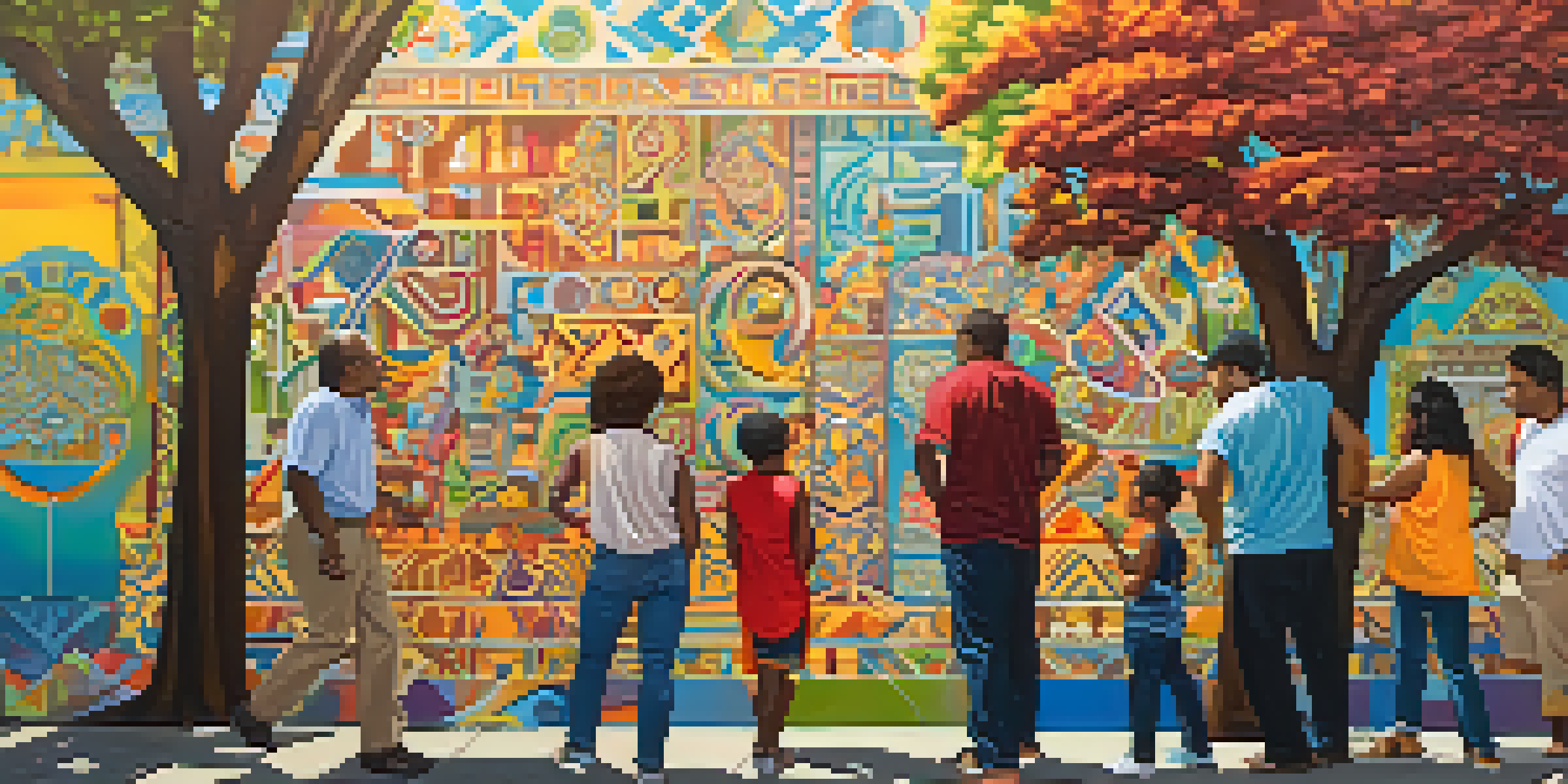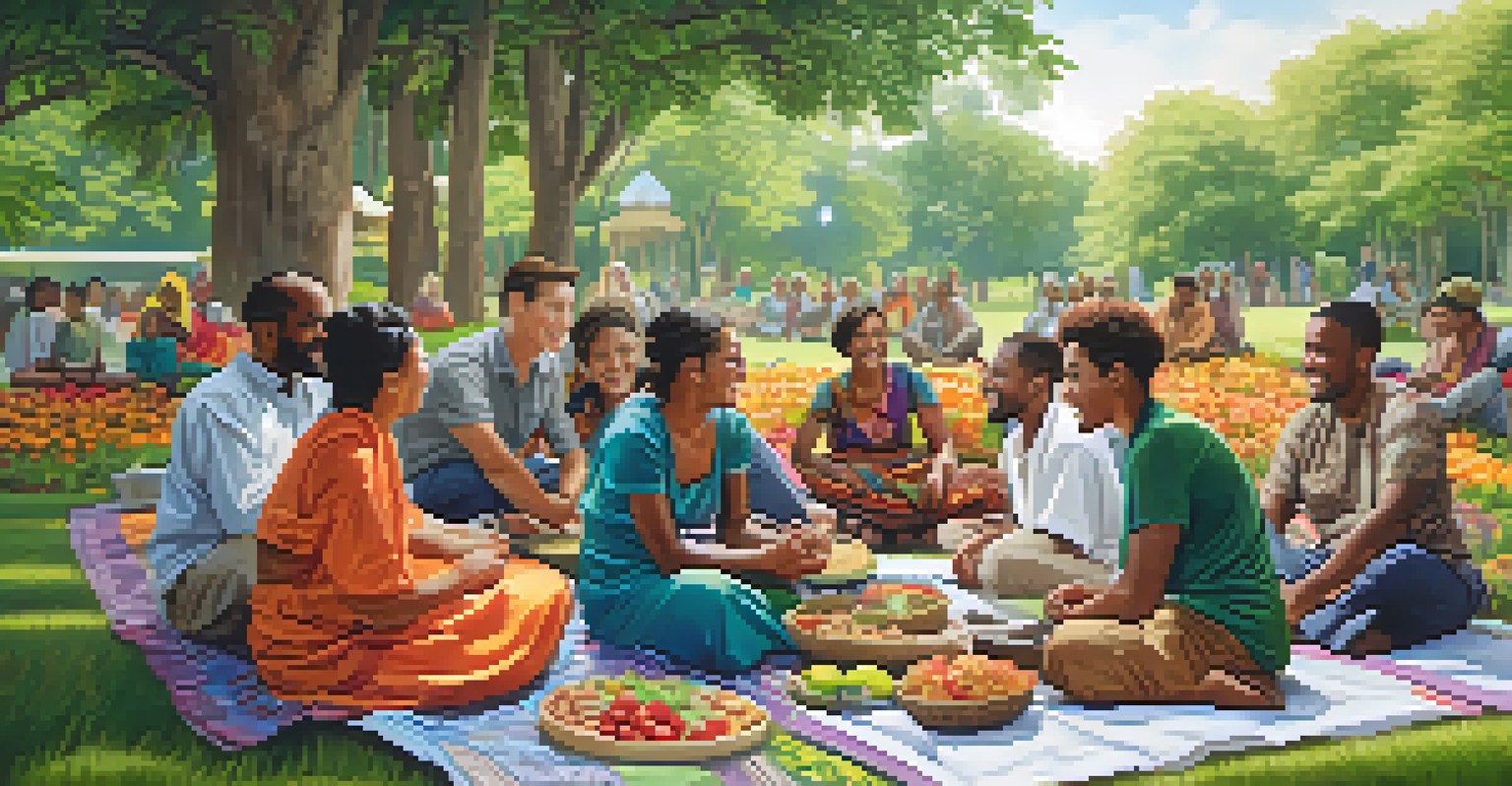The Role of Social Media in Cultural Appropriation Discourse

Understanding Cultural Appropriation in the Digital Age
Cultural appropriation refers to the adoption of elements from one culture by members of another, often without understanding or respect for their significance. In today's interconnected world, social media acts as a powerful platform for discussing these sensitive issues. It allows individuals from diverse backgrounds to voice their opinions and share their experiences, which can lead to greater awareness and understanding.
Cultural appropriation is the act of taking or using elements from one culture by members of another culture, often without permission or understanding of the original culture's significance.
However, this also means that misunderstandings can spread rapidly. A single post or tweet can ignite a firestorm of debate, bringing attention to cultural appropriation cases that might have gone unnoticed otherwise. This dynamic creates both opportunities and challenges in addressing the complexities of cultural exchange in a globalized society.
As users engage with these conversations, it's essential to approach them with empathy and a willingness to listen. Social media can bridge gaps between cultures, but it requires open dialogue and a commitment to learning from one another.
The Rise of Activism on Social Media Platforms
Social media has become a breeding ground for activism, enabling individuals to rally around causes like cultural appropriation. Hashtags such as #CulturalAppropriation and #RespectIndigenousCultures have emerged, providing a space for marginalized voices to be heard. This grassroots activism often captures the attention of mainstream media, amplifying the discourse beyond social media platforms.

Moreover, these movements encourage users to educate themselves about the cultures they engage with. By sharing educational resources, personal stories, and cultural backgrounds, social media users can foster a deeper understanding of the issues at hand. This shift towards informed activism highlights the importance of context in discussions about cultural exchange.
Cultural Appropriation Explained
Cultural appropriation involves adopting elements from one culture by another, often without proper understanding or respect.
However, it's crucial to recognize that not all discussions are constructive. Some individuals may use social media as a battleground for conflict rather than understanding, leading to polarization and further misunderstandings. Navigating this landscape requires careful consideration of tone and intent.
The Role of Influencers in Cultural Appropriation Discussions
Influencers play a significant role in shaping conversations about cultural appropriation on social media. Their platforms often reach millions, making them powerful advocates for change or, conversely, sources of controversy. When influencers engage with cultural elements inappropriately, they can face backlash that sparks broader discussions about respect and representation.
In a world that is increasingly interconnected, the lines between appreciation and appropriation are often blurred, making it essential to engage thoughtfully with diverse cultures.
Some influencers use their platforms to educate their followers about the nuances of cultural appropriation. They may highlight the importance of honoring the origins of certain practices, fashion, or art forms. By doing so, they not only raise awareness but also encourage their audience to think critically about their own cultural consumption.
However, the influence of these social media figures can be a double-edged sword. If influencers misstep or fail to acknowledge the complexities of cultural exchange, they risk perpetuating harmful stereotypes. This underscores the need for influencers to approach cultural elements with sensitivity and responsibility.
Social Media: A Double-Edged Sword for Cultural Exchange
While social media can foster positive cultural exchanges, it can also lead to appropriation. The accessibility of diverse cultural content can encourage appreciation, but it may also result in individuals taking elements without proper context or credit. This fine line between appreciation and appropriation often becomes blurred on digital platforms.
For instance, a viral trend might encourage users to adopt traditional clothing or practices without understanding their significance. This can lead to backlash from the communities being represented, as seen in various online debates. Such incidents highlight the need for a more nuanced understanding of cultural elements in the digital space.
Activism on Social Media Grows
Social media has become a vital platform for activism, allowing marginalized voices to raise awareness about cultural appropriation.
Ultimately, this duality calls for a critical examination of how we engage with culture online. Encouraging respectful dialogue and promoting cultural sensitivity are essential steps in navigating this complex landscape.
The Impact of Social Media on Public Perception
Social media has dramatically shifted public perception of cultural appropriation. As discussions unfold online, they influence how audiences view cultural exchanges and the behaviors associated with them. This shift can lead to greater scrutiny of brands, celebrities, and even everyday individuals who engage in cultural practices.
For example, when a celebrity sports a traditional outfit from another culture without acknowledgment, social media users can quickly call out the perceived insensitivity. These reactions can lead to boycotts, apologies, or even changes in how cultural elements are marketed. This shows the power of collective voice in shaping cultural norms.
As a result, public figures and companies increasingly recognize the need to be culturally aware. The pressure to engage thoughtfully with diverse cultures is growing, which may lead to more respectful practices in the future.
Navigating the Fine Line Between Appreciation and Appropriation
Understanding the distinction between cultural appreciation and appropriation is crucial in today's digital landscape. Appreciation involves respecting and valuing another culture, often through learning and collaboration. In contrast, appropriation typically occurs when cultural elements are used without acknowledgment or understanding, often resulting in exploitation.
Social media provides a platform for these discussions to flourish, allowing individuals to share their perspectives on what constitutes respectful engagement. By fostering open conversations, users can better navigate this complex terrain and learn to appreciate cultures in a way that honors their origins.
Influencers Shape Cultural Dialogue
Influencers significantly impact discussions on cultural appropriation, as their actions can either promote understanding or provoke controversy.
Ultimately, cultivating an awareness of these nuances can encourage more thoughtful interactions online. This awareness not only benefits individuals but also enriches the broader dialogue surrounding cultural exchange.
Future Directions for Social Media and Cultural Discourse
Looking ahead, the role of social media in cultural appropriation discourse is likely to evolve. As more individuals engage with these conversations, the potential for growth in cultural understanding increases. This shift could lead to new norms surrounding cultural exchange that emphasize respect and collaboration.
Platforms may also adapt to facilitate more constructive discussions. By implementing features that promote educational content and responsible engagement, social media can become a more supportive space for cultural dialogue. These changes could help diminish the instances of appropriation and encourage genuine appreciation.

In conclusion, the journey toward respectful cultural exchange requires ongoing dialogue and a commitment to learning. By leveraging the power of social media, we can work together to create a more inclusive and understanding digital landscape.